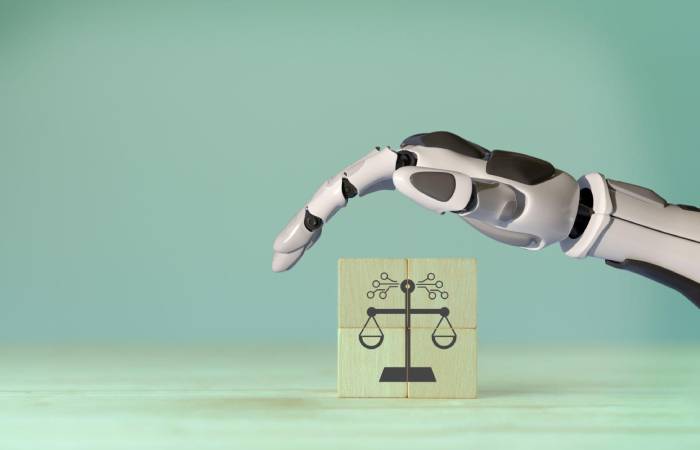Table of Contents
Introduction
AI Ethics is artificial intelligence that abides by simple ethical guidelines concerning fundamental values, including individual rights, privacy, impartiality, and honesty. Equally, AI has become vital to products and services; organizations are initializing the development of AI codes of ethics.
Moreover, a robust AI code of ethics can include evading bias, ensuring users’ privacy & data, and mitigating environmental risks.
Importance of AI Ethics:
AI ethics is of utmost importance in this rapidly advancing field of artificial intelligence. It functions as a moral compass to guide AI technologies’ development, deployment, and use. Ethical considerations are essential for several reasons:
- Equality and Bias Mitigation: AI systems can propagate and intensify existing societal biases, leading to unfair outcomes. Therefore, ethical guidelines ensure that AI applications are equitable and non-discriminatory.
- Privacy and Data Security: Guarding individuals’ privacy and sensitive information is crucial. AI ethics commands responsible data handling and safeguards against unauthorized access, ensuring trust in AI systems.
- Accountability: Ethical AI inspires transparency and accountability, clarifying who is responsible for AI decisions and actions, which is essential in case of errors or harm.
- Safety: Ethical AI prioritizes safety, reducing the risk of AI systems triggering harm, whether in autonomous vehicles, healthcare, or other domains.
- Public Trust: Maintaining ethical principles promotes public trust in AI, fostering more extensive adoption and societal benefits.
What are the Ethical Challenges of AI?
Ethical challenges in artificial intelligence (AI) are complex and multifaceted. One of the chief concerns is bias and discrimination, as AI systems can inadvertently propagate and even exacerbate societal prejudices in the data they are trained on.
Such raises issues related to equality, accountability, and transparency, as it’s often unclear how AI decisions are made and who is responsible for them. On the contrary, privacy is another significant concern, as AI technologies can infringe on individuals’ personal information and data security if not properly managed.
Additionally, there are dilemmas surrounding the potential misuse of AI for harmful purposes, such as deepfakes and autonomous weapons. Significantly, the challenge of striking the right balance between AI’s benefits and its ethical implications, safeguarding human values and rights, remains a pressing concern.
Practical AI ethics outlines, and regulations are crucial in navigating these challenges and ensuring responsible AI development and deployment.
AI Code of Ethics Examples:
AI code of ethics is guidelines and principles that administrate the responsible development and use of artificial intelligence. Here are some examples:
- AI systems should be designed and deployed, ensuring fairness and equity, avoiding biases and discrimination on the basis of gender, race, or other factors.
- Guarding individuals’ privacy and sensitive data is paramount. AI should obey to strict data protection and security measures, gaining informed consent when necessary.
- Establishing clear lines of responsibility, making it evident the responsible parties for AI system decisions and actions, particularly in cases of harm or errors.
- AI must aim to capitalize on benefits to humanity and diminish harm. Developers should prioritize the welfare of individuals and society.
- The use of AI must prevent malicious purposes or infringe on human rights. Subsequently, there should be mechanisms in place to prevent such misuse.
- Developers and organizations ought to be transparent about how AI systems work, their decision-making processes, and the data they use. Hence ensuring users can understand and trust AI applications.
The above examples imitate the fundamental ethical principles to ensure AI technologies are developed and used in a method that aligns with human values and societal well-being.
Benefits of AI Ethics:
There are various benefits to ethical AI, including:
- Increased trust and adoption: On knowing the ethical use of AI systems, people are more likely to adopt them and use them to their full potential. This drives benefits such as increased productivity, efficiency, and innovation.
- Reduced risk and liability: It helps to reduce the risk of the use of AI systems for harmful purposes, such as discrimination, manipulation, or surveillance. Such can protect individuals and organizations from liability.
- Improved social and environmental well-being: The use of ethical AI extends to solving the most pressing problems in the world. For instance, poverty, disease, and climate change. Its benefits stretch to create a more just and equitable society.
Conclusion:
In conclusion, AI ethics plays an indispensable role in the responsible evolution of artificial intelligence. Additionally, it serves as a compass guiding the development and deployment of AI technologies. Subsequently ensuring they align with human values and societal well-being.
AI ethics promotes trust, minimizes harm, and supports innovation by addressing precarious concerns like justice, transparency, privacy, accountability, and safety. As AI continues to permeate various aspects of our lives, a resilient commitment to ethical principles becomes increasingly crucial to navigating the challenges and opportunities of this transformative technology.
Embracing AI ethics is not simply a choice but a necessity to reveal the full potential of AI while safeguarding our collective values and interests.

